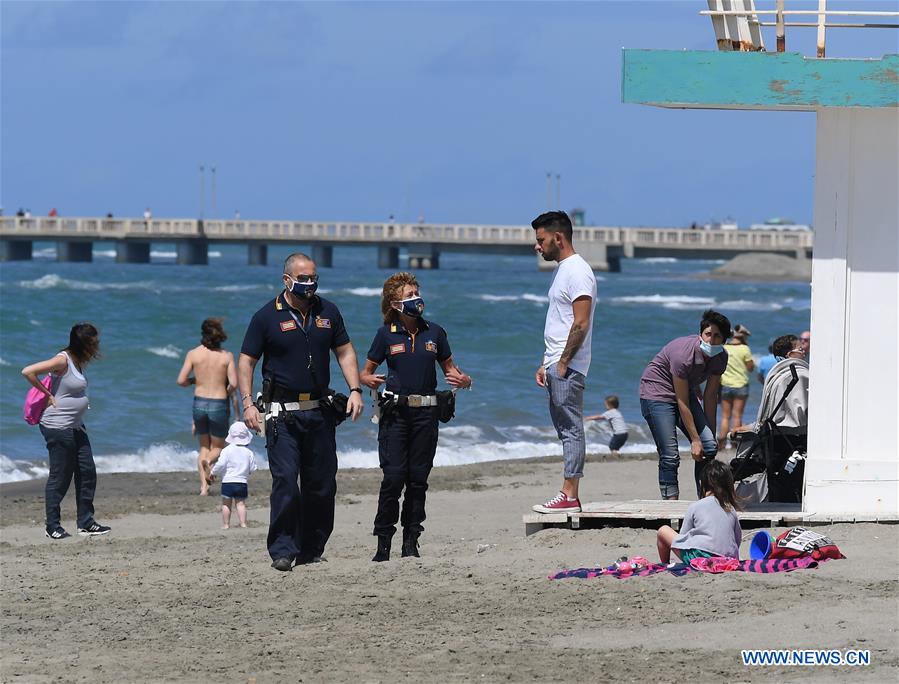
Police officers wearing face masks patrol a beach in Ostia, Italy, on May 19, 2020. A further 162 COVID-19 patients had died in the past 24 hours in Italy, bringing the country's toll to 32,169, out of total infection cases of 226,699, according to fresh figures on Tuesday. (Photo by Alberto Lingria/ Xinhua)
ROME, May 19 (Xinhua) -- A further 162 COVID-19 patients had died in the past 24 hours in Italy, bringing the country's toll to 32,169, out of total infection cases of 226,699, according to fresh figures on Tuesday.
Tuesday's number of deaths bounced from Monday's tally of 99, the first time Italy's daily casualties were lower than 100 since March 10. Italy also registered 813 new cases of infection nationwide in the 24-hour period.
Nationwide, the number of active infections fell by 1,424 cases to 65,129 cases, down from a total of 66,553 infections on Monday, according to the Civil Protection Department.
Of those who tested positive for the new coronavirus, 716 are in intensive care, 33 fewer compared to Monday; and 9,991 are hospitalized with symptoms, down by 216 patients over the past 24 hours.
The rest 54,422 people, or about 84 percent of those who tested positive, are quarantined at home with no symptoms or only mild symptoms.
Recoveries rose by 2,075 compared to Monday, bringing the nationwide total to 129,401 -- up from 127,326 recoveries on Monday.
The Lombardy region whose capital is Milan still led the way in terms of cases with 27,291 active infections, followed by its neighbors Piedmont with 9,635 cases and the Emilia-Romagna region with 5,330 cases.
In the rest of Italy's 20 regions, the figures ranged from 3,786 cases in the central Lazio region, where Rome is located, to 49 infections in the northern Valle d'Aosta region in the Alps.
ITALIAN BUSINESSES "PASS THE TEST"
The Italian General Confederation of Enterprises, Professions and Self-Employment (Confcommercio) reported Tuesday that the almost 800,000 businesses that reopened on May 18 after over two months of lockdown have "passed the test" in terms of compliance with new anti-coronavirus regulations.
"It was a bit like the first day of school," Confcommercio wrote.
Over 90 percent of fashion retailers reopened, and the most sought-after items were lingerie, trousers, shirts, shoes and accessories.
The very first post-lockdown jewelry purchase in Italy was a pendant bought by a little boy as a belated Mother's Day present, according to Confcommercio.
Of Italy's many outdoor neighborhood markets, 50-60 percent have reopened so far. The rest are still struggling with "organizational and logistical difficulties" stemming from the new anti-COVID security protocols.
Restaurants and coffee bars were off to "a slow start," Confcommercio wrote, saying that 70 percent of them have reopened, but with 40 percent fewer employees (about 400,000 workers).
In a report out Tuesday, the National Farmers Confederation (Coldiretti) said that consumption in restaurants and agritourism facilities in the days immediately following the end of the lockdown has fallen by an estimated 80 percent compared to the same period last year.
This was due not so much to the new anti-COVID-19 safety protocols -- such as fewer tables in restaurants in order to guarantee social distancing -- as to the "total absence of tourists, both foreign and domestic" as well as the absence of office workers, most of whom are working remotely.
Coldiretti described this drastic drop in consumption as "a hard blow to the national economy."
VACCINE "A GLOBAL RIGHT NOT A PRIVILEGE"
Meanwhile, on the international stage, Italian Health Minister Roberto Speranza said that "the development of a safe, effective COVID-19 vaccine is a fundamental challenge" and "we must fight for this vaccine to be considered a global public good, a right for all and not a privilege for the few."
Speranza made these remarks during the second and last day of the 73rd World Health Assembly, which is the decision-making body of the World Health Organization (WHO).
The World Health Assembly, which opened on Monday, was held virtually due to the pandemic.
"I wanted to stress the importance of the WHO and the need to reinforce its central role, especially in times of crisis," Speranza explained in a statement.
"We must ensure that (the WHO) remains completely independent of external influences, be they political or financial, and that it is guided solely by science," said the Italian minister.
Also on Tuesday, the Health Ministry published the National Institute of Health (ISS) findings of the life span of the new coronavirus on different surfaces that are encountered commonly in daily life.
On printed paper and tissue paper, the virus can remain alive and with the power to cause infection for up to 30 minutes after contamination, according to the findings.
The amount of time rises to up to one day after contamination on fabrics, up to two days on paper money and glass, and up to four days on stainless steel and plastic.
Regarding surgical masks, the viral contents remain active for up to four days on the inside layer and up to seven days on the outside layer, the Health Ministry said. Enditem



